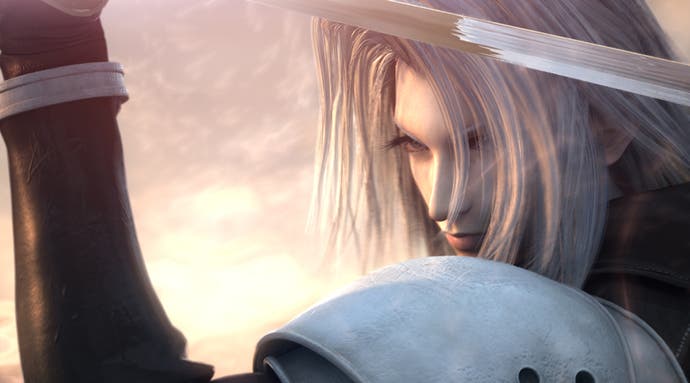Final Fantasy VII: Crisis Core
Cloud's silver lining?
It's easy to forget but Cloud was an unvoiced protagonist. Throughout Final Fantasy VII his reactions and attitudes were conveyed by way of simple gestures and the reactions of others. This choice, as with Chrono Trigger, allowed players to cast themselves in the lead role, the game's protagonist a blank canvas onto which all players from all nations with all accents could superimpose them. Crisis Core, by contrast, is voiced by a boisterous, over-enthusiastic American boy and kapow there snaps the suspension of disbelief, dropping with it a hundred thousand players who don't look or sound alike. In time, the chirpy American drawl ceases to irritate and Zack's voice actor does a good job of showing his character's maturing and developing over the 15-hour storyline, but it's still an initial shock.
The game acts as a prequel to the events of the original, leading up to the fateful events at Nibelheim (which were shown by way of flashbacks in the original game). This allows Crisis Core to revel in back-story. You'll hear how Sephiroth first fell out with Genesis and how Aerith was called to sell flowers in Midgar; you'll witness the time that Zack bought the pink ribbon that would never leave her hair and, of course, see the final (excellent) scenes of this sub-drama from a new and enlightening perspective. This fan service is in no way subtle or elegant but it does enrich the game significantly to the mythology's true believers.
As a result this is not a game for newcomers - at least, not for newcomers who want to get to grips with the story. 'Soldier', 'Avalanche', 'Seed', 'Jenova', 'Mako', 'Turks': the list of ill-explained terminology isn't so much off-putting as impenetrable to the uninitiated and the iconography that the game so successfully trades in will be meaningless to beginners.
Zack is a dark-haired version of Cloud (literally: Cloud adopts his persona later on), an elite Soldier working for the energy-sapping multinational company Shinra. Throughout the game he works alone so there is none of the team management seen in most RPGs. Indeed, while Crisis Core is built upon the RPG basics of exploring areas, hunting for treasure chests, fighting randomly attacking monsters, managing inventory and leveling up, the actual execution of these mechanics is fresh and interesting, pulling the game into new territory outside the genre's confine.

Principle amongst its innovations is the battle system which acts as a kind of RPG system sped up. During fights you have free movement control of Zack and you can block and dodge with the face buttons as in an action game. Conversely, attacks and magic must be executed up from a horizontal menu at the bottom of the screen. As such you'll find yourself running around the battle screen, feverishly inputting attacks via the overlaid menu while trying to weave past enemy attacks. Certainly on the default difficulty it's possible to simply button-mash through battles, lining up various attacks with deft but unthinking use of the buttons. After the first play through and at higher difficulty, though, the game grows far more tactical and you'll need to make use of the 'defend' and 'roll' manoeuvres if you're to be successful - although few will pursue the game this far in.
The moves at your disposal are directly tied to the 'materia' you own, crystals that must be equipped if you're to take advantage of their power. Materia can be combined to create different types and you can equip and increasing number of them as your rank within the Shinra organisation increases. The vast array of different materias on offer allows you to customise Zack in almost any direction you choose and, as he can equip so many different moves, you feel more individually powerful and flexible than any single RPG protagonist before.

